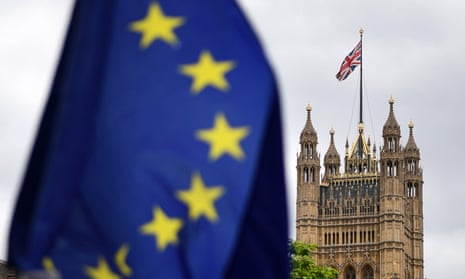The British public do not share the government’s appetite for perpetual conflict with the EU and more people see the bloc as a key future partner than the US, according to a report on post-Brexit foreign policy.
“The Johnson government seems to need the perennial fights of a permanent Brexit,” the report, by the European Council on Foreign Relations (ECFR) thinktank, said, warning that its approach was “eroding the UK’s capacity to cooperate with the EU”.
At the same time, it said, “the British public do not have any particular animus towards the EU” and while they do “value British sovereignty and independence, they would support a foreign policy that worked cooperatively with the bloc”.
Polling for the report found people were evenly split on who was most to blame for the current dire state of relations between the UK and EU, with 39% blaming Britain and 38% saying they considered the bloc responsible.
The divide was predictably partisan, with 70% of Conservative voters blaming the EU and 66% of Labour voters the UK. It was strongest among those with a keen interest in politics, however: most people were less bothered. Regardless of who they saw as responsible, 39% of the public - a majority of those with an opinion - considered the EU a key partner for the UK in future, compared to 22% for the US.
The survey also found the lack of enthusiasm for the US extended to following it into any conflict with China, with 54% believing there was already a cold war between the two and 45% preferring the UK to stay neutral in the event of a war.
More broadly, the UK government’s vision for “Global Britain” aimed “to restore British greatness as a maritime trading nation”, the report said – but the evidence showed it amounted to little more than “a delusion rooted in a misremembered imperial past”.
The British military, “despite its grand traditions, no longer provides the relative advantage for the UK that it once did”, the authors, Nick Witney and Jeremy Shapiro, said. Polling showed the public was “at best indifferent to the restoration of Britain as a global military power”.
The ECFR survey found only 6% of respondents favoured a UK foreign policy that prioritised Britain’s military strength, while 40% said they would like foreign policy to focus primarily on strengthening the domestic economy.
“The government’s pride in seeing British naval forces steam into the Pacific Ocean does not seem to inspire the public,” the authors said.
Rather than looking to the past – and across the world to “a distant Indo-Pacific” – the UK should “rely on its privileged position in international institutions, its world-class diplomatic corps, and a careful effort to nurture its still-considerable soft power”, they argued.
They said the UK could “gain the prosperity and respect it craves by … working with a variety of partners”, effectively “triangulating” between EU and US positions.
Instead, however, Global Britain “had little role in it for the EU” and even after formal Brexit, Boris Johnson’s government “seems to need perennial fights with the EU to justify its political existence”. The past year has been marked by ongoing battles between the UK and the EU over multiple issues including fishing licences and the Northern Ireland protocol.
But the ideology of “permanent Brexit … cannot suspend the laws of distance and strategy”, they argued. Faced with “increasing geopolitical competition, authoritarian advances and geo-economic coercion, the EU remains Britain’s essential partner”.
It was “delusional” to believe in “vast untapped commercial opportunities on the far side of the world that can compensate for the loss of the EU single market”, the report said, and “dangerous to turn a blind eye to what Britain could gain in global influence through cooperation with the EU.”
A close strategic partnership with the EU would allow the UK to “both protect its sovereignty, and become a force in global affairs”, the report said, and could command political support in the UK “despite the daily drumbeat of EU-bashing by the Johnson government”.
Britain still has “extraordinary assets and can forge an effective foreign policy”, the authors said. “To do so it must focus on British strengths, avoid military adventures in distant lands, and find balanced, effective working relationships … with both the EU and the US.”
